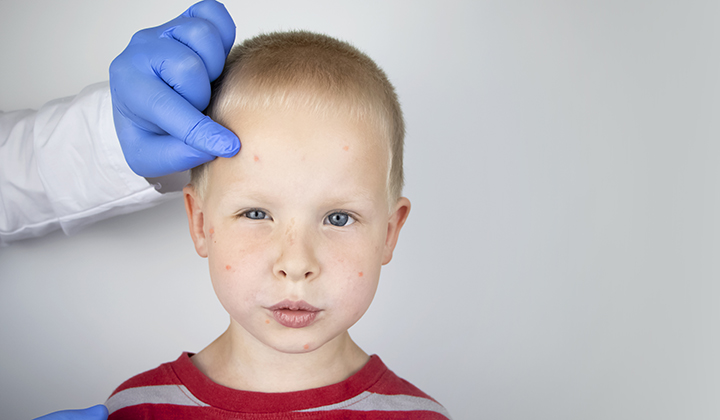Get updates
Have a parenting hack to share? Or a topic you'd like to see?
Understanding Measles: What parents need to know

As a parent, the health and safety of your child is always a top priority. With recent measles cases confirmed in the Midwest, it's more important than ever to be informed about this highly contagious disease. This blog aims to provide you with essential information about measles, its symptoms, how it spread and the importance of vaccination, so your family can stay healthy.
What is measles?
Measles is a highly contagious viral infection that can lead to serious health complications. It spreads through respiratory droplets when an infected person coughs or sneezes. The virus can live in the air for up to 2 hours after the infected person has left the area.
Measles symptoms
Measles symptoms typically appear 7-14 days after exposure to the virus and can include:
- Fever
- Cough
- Runny nose
- Red and watery eyes
- Rash: A rash usually appears 2-4 days after the initial symptoms, starting at the hairline and spreading downwards over the face, neck and body. Small spots inside the mouth on the cheek may also appear before the rash.
When to see a doctor
If you suspect that you or your child has measles, it's crucial to call your health care provider before going to the clinic or emergency department. This helps prevent the spread of the infection. Your provider will assess the symptoms over the phone and give you instructions on how to safely arrive at the clinic if necessary.
How contagious is it?
Measles is extremely contagious. If you are unvaccinated and have never had measles, you have a greater than 90% chance of developing the disease after contact with an infected person. However, if you have received both recommended doses of the measles vaccine, your risk is significantly lower. Many measles outbreaks in the U.S. start from travel-related infections; unvaccinated individuals visiting countries where measles is common are at high risk of contracting the disease and bringing it back.
The importance of vaccination
Vaccination is the most effective way to protect against measles. The Centers for Disease Control and Prevention (CDC) states that about 95% of people will be protected after one dose of the MMR vaccine, and there is lasting protection in 99% of individuals who receive both doses. The first dose is usually given between 12 and 15 months of age, with a second dose at 4-6 years old. If full protection is desired sooner, it is also acceptable to give the second dose before 4 years of age as long as it at least 28 days after the first dose. During an outbreak, infants as young as 6 months can also receive the vaccine, but they will need an additional dose at 12 months.
Prevent the spread
If your child has measles, they should stay home from school or day care for at least 4 full days after the rash appears to ensure they are no longer contagious. If you or your child are exposed to measles and are not immune, you will need to stay away from school or daycare for 3 weeks (21 days) from the day of exposure or 28 days if prophylaxis was given after an exposure.
Common complications
Measles can lead to serious health complications, especially in young children. Common complications include ear infections, diarrhea and pneumonia in about 1 in 20 children. In rare cases, measles can cause encephalitis (infection of the brain), which can result in permanent brain damage. Between 1-3 out of every 1,000 children with measles die.
Protect your family
To protect your family during this outbreak, ensure that everyone is up to date on their measles vaccinations. If you have any concerns or questions about measles, don't hesitate to contact your health care provider.
By staying informed and taking preventive measures, you can help protect your family and community from the spread of measles. Stay safe and healthy!
References:
Vaccine Update: Measles Vaccine Recommendations During Outbreaks

